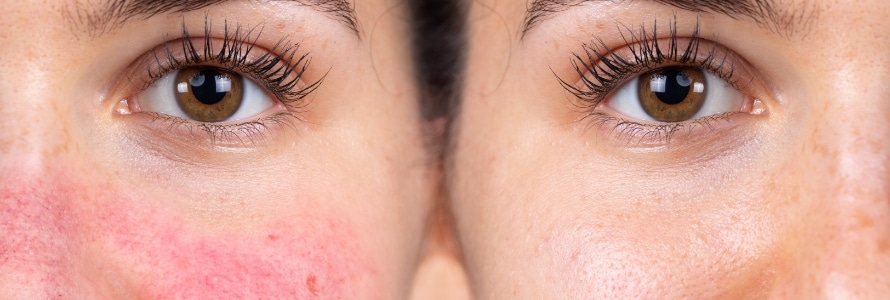
Rosacea is an incredibly common chronic skin condition that impacts more than 14 million Americans. There are causes for rosacea, and it is not contagious. The condition is characterized by red inflammation that can affect the cheeks, nose, chin, forehead, and eyelids. Patients usually first report signs of rosacea after the age of 30, experiencing cycles of flare-ups in which symptoms are much worse and remission when symptoms are reduced.
Symptoms of Rosacea
Rosacea shows up in various ways and at varying levels of severity. The condition occurs most often among people with fair skin who blush or flush easily. It is also more common in women than men, but men tend to suffer from more severe symptoms. Common symptoms of rosacea include:
- Flushing
- Persistently red skin on the face
- Bumps or acne-like pimples
- Visible blood vessels on facial skin
- Watery or irritated eyes
- Burning, itching, or stinging of facial skin
- Skin roughness and dryness
- Raised red patches
- Swelling (edema)
Symptoms can also appear on the neck, chest, scalp, and ears. If rosacea is left untreated, bumps and pimples may form; the end of the nose may become swollen, red, and bulbous; and eyes may water or become irritated.
Causes of Rosacea
According to the National Rosacea Foundation, rosacea can be triggered by a wide variety of factors:
- Sun exposure
- Hot or cold weather
- Emotional stress
- Wind
- Alcohol
- Heavy exercise
- Spicy foods
- Hot baths
- Heated beverages
- Some skin care products
- Humidity
- Indoor heat
Treatments for Rosacea
While there is no cure for rosacea, your Stone Oak Dermatology provider will develop a treatment plan for your unique symptoms. Oral antibiotics and topical medications can help reduce the severity of the symptoms. Topical treatments can be used to manage the condition when in remission. In more severe cases, a vascular laser or intense pulsed light source may remove any visible blood vessels and reduce excess redness and bumpiness on the nose.
We also recommend a gentle daily skincare routine with a mild, non-abrasive cleanser. Rinse with lukewarm water and blot the face dry with a soft cloth—no rubbing. Always opt for sunscreens with SPF 15 or higher that eliminate UVA and UVB rays. Patients are also encouraged to record flare-ups to help identify any lifestyle and environmental triggers that aggravate the condition.
How common is rosacea?
Rosacea is fairly common among Caucasians. About 10% of Caucasians have rosacea, with the majority of the cases being mild.
At what age does rosacea develop?
Rosacea can start to develop anywhere from your 20s to your 40s. However, most of the time, it begins to develop after the age of 30.
Is rosacea hereditary?
Rosacea is not directly hereditary, but it is heavily dependent on the fairness of your skin, which is typically a trait that is passed down through generations.
Is rosacea contagious?
No rosacea can not be spread by contact and is not contagious. Oftentimes, antibiotic treatment is used to treat rosacea for its anti-inflammatory properties.
Can certain foods or drinks worsen my rosacea?
Alcohol and spicy foods can cause symptoms of rosacea to worsen as they cause the skin to become flushed. It is best to avoid these things if you are struggling with your rosacea.
Who Is More At Risk of Developing Rosacea?
Rosacea is a skin condition that can affect everyone, but it is more common among middle-aged adults. It usually affects women who have fair skin, but men can also develop it. When men develop rosacea, the symptoms that follow are usually more severe.
How Is Rosacea Diagnosed?
Dermatologists typically diagnose rosacea based on the appearance of a patient’s skin, eyes, and their medical history. However, tests may be performed to rule out other possible skin conditions besides rosacea. Rosacea is one of those conditions that can easily be confused with another.
Can Rosacea Be Linked to Other Health Conditions?
Rosacea is usually nothing more than a skin condition. However, it is possible for it to be linked to other health problems, such as cardiovascular disease, Crohn’s disease, and even Alzheimer’s disease.
Is It Possible for Rosacea to Worsen Over Time?
Yes, if left untreated, it is more than possible for rosacea to worsen over time. Fortunately, rosacea can be treated in a variety of ways.
These treatment options include the following:
- Topical medication
- Laser therapy
- Wearing sunscreen with an SPF level of 30 or higher
- Adjusting your diet
- Following a strict skincare regimen
- Scheduling regular check-ups with your dermatologist
What Can Trigger Rosacea?
What ultimately triggers rosacea varies from person to person. Some people may have it due to stress and strong emotions, like anger. Others may develop rosacea because they eat spicy foods.
Below is a list of other potential triggers for rosacea:
- Excessive sun exposure
- The weather is either too hot or too cold
- Doing an intense exercise
- You are consuming foods that are rich in histamines
- You are consuming too many dairy products
Because a number of factors can cause rosacea, it is best to consult a professional dermatologist.
Schedule Your Appointment
To schedule your rosacea consultation, call our San Antonio clinic at 210-494-0504 or visit us online stoneoakdermatology.com.

